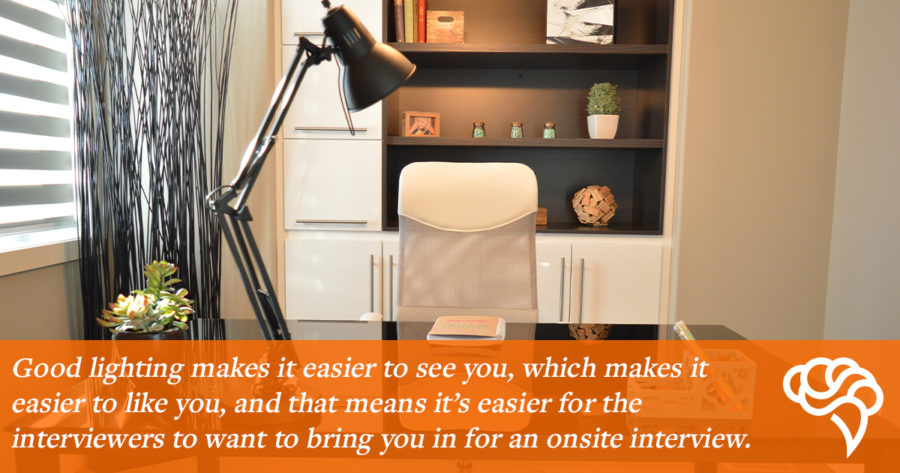Why PhDs (Like Me) Fail Video Interviews – Here’s What To Avoid

I was pretty confident going into my first video interview.
The position was perfect for me.
I had the right technical skills for the job and I had practiced how to highlight my transferable skills in the behavioral interview questions.
It was going to be a breeze.
I even had experience with video calls, as lots of my family lives overseas.
So, I focused my attention on learning about the company and writing down my answers to hundreds of common interview questions.
I had my resume memorized.
I wrote down questions that I would ask the interviewers.
I was prepared.
The day of the interview rolled around and I was ready.
But — boy, oh boy — as soon as the interview got started, I realized I had missed key aspects of preparing for a video interview…
As I answered their call and my video popped up on the screen, my image was very dark.
It was the evening, and I hadn’t realized just how dark it was in the house.
Plus, because it was prime Internet time, the connection kept freezing.
A few times, I was in the middle of my carefully thought-out interview answers and realized that the connection had been down for nearly a minute!
I was so flustered.
How could this have spiralled so far out of control?
I tried to pretend that everything was fine.
I just kept going, answering the questions as best I could, through the broken Internet connection.
The interview ended as awkwardly as it began, and I knew that I had totally screwed up.
I was the perfect candidate for the position but, because I neglected to prepare adequately for the video interview, I lost out.
It was a major learning experience and I want to share what I learned with you.
Why Video Interviews Are Just As Important As In-Person Interviews

Many employers are moving towards the use of video interviews.
Video interviews allow an employer to get a better feel for the fit of a candidate before they are brought in for an onsite interview.
It saves them both time and money.
As reported by The Society For Human Resource Management, 75% of companies are using video interviews in their hiring process.
And, this trend is increasing.
According to LinkedIn, 56% of talent professionals and hiring managers say that new interview tools are the top trend impacting how they hire.
And, this includes video interviews — both 2-way and 1-way video interviews.
According to Deloitte, using video interviews and AI can reduce hiring time from weeks to days, and can reduce the number of pre-hire questions from hundreds to just a handful.
Many companies are using the combination of video and AI, by using services such as HireVue, to screen candidates.
Video interviews are becoming ubiquitous.
They are a part of the majority of the recruiting and hiring processes.
You must prepare yourself well so that you can execute video interviews properly.
Because, if the only way to a job offer is through a video interview, you need to know what you are doing.
I learned by trial and error.
But, you don’t have to.
Learn from the mistakes I made, so that you can ace your next video interview.
5 Awful Choices I Made During My First Video Interview
The choices I made leading up to my first video interview were terrible.
The interview was a catastrophe.
But, I learned my lesson and I never made those mistakes again.
Here are 5 major errors I made in my first video interview that you should avoid at all costs…
1. My face was shrouded in darkness.

Think ahead about the time of your interview and the place you position yourself in your house.
Lighting should be your number one concern when preparing for a video interview.
If your interviewer cannot see you, there is no way they are going to hire you.
If your face is covered in shadows, or your entire space is so dark that nothing is really visible, you are in trouble.
Well before your interview is scheduled, test out the lighting in your house and then take steps necessary to make your lighting excellent.
To have good lighting:
- If there is sun, face a window because natural light is the best light.
- If there is no sun, use several lamps to light yourself.
- One lamp should be directly in front of you, behind your computer, and shine directly into your face (yes, this might be uncomfortable, get over it).
- Do not have a light behind you, as this causes shadows.
- Test your setup by having a practice video call with a friend.
Take the lighting seriously — it is super important.
Because, lighting is about more than just being able to see you.
Good lighting makes the interview more pleasant.
Good lighting makes it easier to see you, which makes it easier to like you, and that means it’s easier for the interviewers to want to bring you in for an onsite interview.
Don’t let bad lighting get in the way of your ability to communicate how your transferable skills make you the best candidate for the job.
2. I wore pajama pants.
You should make all the preparations that you would make for an in-person interview for a video interview.
This includes dressing professionally, from head to toe.
Sure, the interviewers are likely to only see the top half of you, but you should dress professionally in the same way you would for an in-person interview for 2 main reasons:
- Professional attire shifts your mindset.
- What if you stand up during the interview?
Putting on your professional clothes, from your blouse or suit to your dress shoes, puts you into a professional mindset.
If you have on a nice button-up shirt but are wearing sweatpants and no shoes, your brain will not switch into professional mode.
Pajamas don’t make you feel confident.
Instead, you might be reminded of a nightmare where you accidentally wore your pajamas to work.
Also, you never know what might happen during the interview.
What if you have to stand up in front of the camera and your interviewers see that you are wearing sweats?
Opportunity lost.
Bottom line, even though it may not seem necessary, dress professionally from head to toe for your video interview.
3. My Internet was slow and glitchy.
Smooth conversation makes for a good interview.
If there is a lag between your visual and audio, the interview will quickly become difficult and stressful.
Just think about all the awkward facial expressions you might be frozen in…
Not good.
Test your Internet speed before your interview and arrange for a hard line connection.
For a successful video interview, you want your Internet speed to be around 10-20 Mbps download and 2 Mbps upload.
You can test your interview speed here: http://www.speedtest.net
Make sure you test your Internet at the time that you will be having your interview, because the speed will vary depending on the level of Internet usage in your area.
And, even if you have a fast Wi-Fi, arrange to have a direct connection to your modem.
Wi-Fi, even when good, can drop in and out without warning, causing your Internet speed to be slow or glitchy.
4. I stared at the tiny picture of myself on the screen during the whole interview.

During an in-person interview, you know that eye contact is essential.
Making quality eye contact demonstrates interest and shows honesty.
So, how do you make eye contact in a video interview? By looking directly into the camera lens.
Looking at the video of the person talking will make it seem like you are looking down.
And, worst of all, looking at the tiny picture of yourself in the corner will make it seem like you are looking away from the interviewers.
You will seem uninterested.
Plus, looking at yourself during an interview can add to your stress.
Instead, you need to look directly into the camera lens on your computer.
This can be a little bit awkward at first, so make sure you practice mock video interviews with friends or family.
A great way to draw your attention to the camera is to tape a little brightly colored happy face right next to the camera.
This will help draw your eyes back to the camera during the interview, when the stress of the interview might cause you to forget about looking there.
It’s okay if your gaze leaves the camera lens occasionally, but make sure that when you are delivering answers to your interview questions, you stare right at the camera.
Be aware of your body language, as well.
Be still and sit up straight, with your shoulders back, to display confidence.
Keep your arms and legs uncrossed to prevent you from looking closed off and cold.
You want your body language to convey that you are confident and friendly — in other words, someone who would be great to work with.
5. My background was cluttered and messy.
Do not let your background introduce distractions into your interview.
The only thing you want the interviewers paying attention to is you.
Place yourself in front of a blank white wall or set up a white poster board behind you, so that the background is not distracting.
Things that should NOT be visible in your background:
- Photos
- Furniture
- Pets
- Messy shelves
- Lamps
- Other people
- Anything else that is not a white wall
It might take some trial and error to find a set up where you have a blank background and good lighting.
That’s why practicing and preparing in advance is essential.
Along the same lines as having a blank background to keep the interviewers focused on you, make sure that there will not be any other distractions during your interview.
Put pets in a different room, have someone else watch your kids, turn off your phone, turn off the notifications on your computer, go somewhere quiet, etc.
Try your best to eliminate anything that may cause unnecessary distractions.
The video interview is a unique type of interview. You need to do all the preparations that you would for an in-person interview and, on top of that, you have to create the right interview environment. This means you need to avoid the mistakes I made in my first interview, such as: the fact that my face was shrouded in darkness, I wore pajama pants, my Internet was slow and glitchy, I stared at the tiny picture of myself on the screen during the whole interview, and my background was cluttered and messy. Learn from my mistakes and prepare the right way so that you can ace your next video interview and land the industry position you want.
If you’re ready to start your transition into industry, you can apply to book a free Transition Call with our founder Isaiah Hankel, PhD or one of our Transition Specialists. Apply to book a Transition Call here.

ABOUT CATHERINE SORBARA, PH.D.
Cathy has a PhD in Medical Life Science and Technology and is COO of the Cheeky Scientist Association. Cathy is passionate about science communication including translating science to lay audiences and helping PhDs transition into industry positions. She is Chair of Cambridge AWiSE, a regional network for women in science, engineering and technology. She has also been selected to take part in Homeward Bound 2018, an all-female voyage to Antarctica aimed to heighten the influence of women in leadership positions and bring awareness to climate change.
More Written by Catherine Sorbara, Ph.D.































